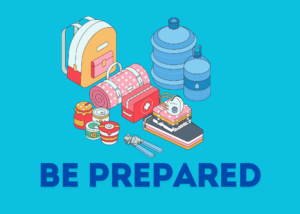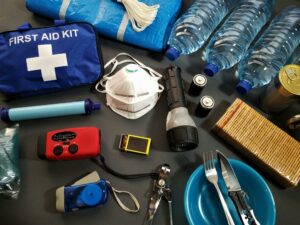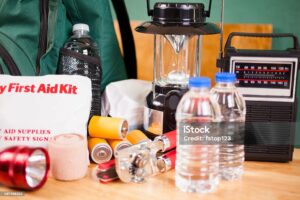
Knowing what to do during an emergency is an important part of being prepared. Below is information to help QTN residents be prepared and be able to help neighbours.
Three Basic Steps to be Prepared
1. Know the risks. Knowing risks, including specific ones in our community, can help you be better prepared. Pay attention to weather warnings and avoid driving and other activities during hazardous weather conditions. Have a battery radio to get information in a power outage.
In Ottawa, it is good to be prepared for the following emergencies:
-
-
- Freezing Rain
- Earthquake
- Snowstorm/Blizzard
- Electrical Emergency
- Tornado
- Explosion/Fire
- Windstorm
- Urban Flood
- Landslide
- Extreme Heat
-
2. Have an emergency kit. Have basic supplies on hand to be self-sufficient for at least three days. Assemble the supplies in an easy-to-carry container and store it in a place that is easy to find.

Basic emergency kit checklist:
-
-
- Water — two litres of water per person per day. Store drinking water in clean, disinfected containers with secure lids.
- Food that won’t spoil – canned food, energy bars and dried foods (replace once a year) Choose foods that you like, are pre-cooked or require no cooking. Store food in screw top jars or sealed containers. Rotate and use food and water every six to 12 months. Before using any food check the containers for any signs of spoilage.
- Manual can opener
- Wind-up or battery-powered flashlight (and extra batteries)
- Wind-up or battery-powered radio (and extra batteries)
- First aid kit
- Extra keys for your car and house
- Cash, travellers’ cheques or change
- Important family documents such as identification, insurance and bank records
- Emergency plan — include a copy in your kit as well as contact information
-
Click here for other suggested emergency kit supplies: https://www.getprepared.gc.ca/cnt/kts/bsc-kt-en.aspx
3. Make a plan. It will help you and your family know what to do.

Emergency preparedness supplies. A large pile of supplies to be used in case of a natural disaster (hurricane, flood, earthquake, etc.) including: flashlight, backpack, batteries, water bottles, first aid kit, lantern, radio, can opener, mask. No people.[/caption]
Having a plan helps to reduce the stress that comes with an emergency. Take a few minutes to make a plan. Make sure everyone in your home knows the plan. Keep a copy in an easy-to-find place. Share with family, friends, and neighbors. Keep a duplicate copy at work or in some other place.
Elements of a plan: Think about the following:
- Safe exits from home and neighbourhood
- Meeting places to reunite with family or roommates
- Designated person to pick up children should you be unavailable
- Contact persons close-by and out-of-town
- Health and insurance information
- Places for your pet to stay
- Risks in your region
- Location of your fire extinguisher, water valve, electrical panel, gas valve and floor drain
Start your plan with this on-line form: https://www.getprepared.gc.ca/cnt/plns/plan/mrgnc-pln-en.aspx
More Information
Below are links to help you prepare yourself and your family in the event of an emergency.
Federal government information about emergency preparations:
- www.getprepared.gc.ca/
- www.preparez-vous.gc.ca/
- https://www.facebook.com/EmergencyReadyinCanada/
- https://www.facebook.com/PretencasdurgenceauCanada?mibextid=ZbWKwL
City of Ottawa information about emergency preparations:
- https://ottawa.ca/en/health-and-public-safety/emergency-preparedness
- https://ottawa.ca/fr/sante-et-securite-publique/gestion-des-situations-durgence
Ontario government information about emergency preparations:
Canadian Red Cross
- https://www.redcross.ca/how-we-help/emergencies-and-disasters-in-canada/be-ready-emergency-preparedness-and-recovery
- https://www.croixrouge.ca/nos-champs-d-action/urgences-et-catastrophes-au-canada/soyez-pret-preparation-aux-urgences?lang=fr-CA&_ga=
Specific Needs
People with disabilities
People living with disabilities and their families need to take their accommodations needs into account. Check out the Ontario government emergency preparedness guide for people with disabilities. It covers the specific needs of people with mobility, vision, and hearing disabilities, high-rise safety, and a checklist for service animals. It also includes useful information for people who may be helping persons with disabilities during an emergency.
Kids and Emergency Preparedness
Kids need to be part of your plan. Getprepared.gc.ca has information on how to talk to your kids about emergencies and help them identify emergency situations and respond to them, including how to call 911.
Pets and Service Animals
Don’t forget your pets! The City of Ottawa has a Pet Preparedness Checklist and Tips to help pet owners plan ahead.
Generator Safety
Check the Canadian Red Cross guide on generator safety. It includes protecting yourself and others from carbon monoxide poisoning and protecting your generation from rain.
Connecting with Neighbours
QTN neighbours help each other during emergencies. During past emergencies, neighbours shared food, generators, help with repairs, and encouragement.
You can prepare by getting to know your neighbours. Think about new neighbours and households that may have special needs, such as elderly persons who live alone. Find opportunities to chat with them and, if you are comfortable, talk about being prepared for any emergency on your street.
In any emergency, make sure you are safe and then help others. QTN gets through them together!
